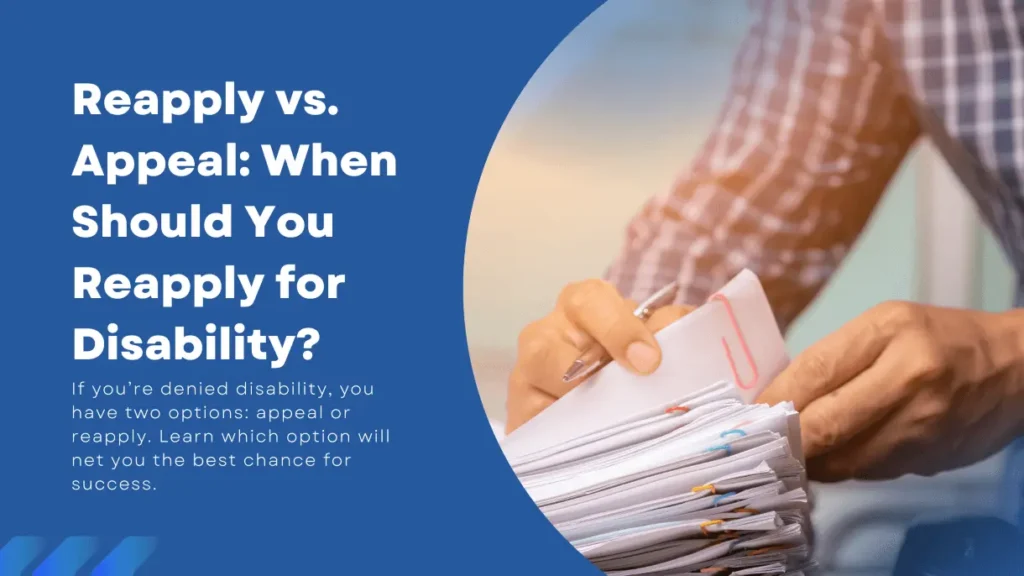So, the Social Security Administration (SSA) denied your disability claim. Rest assured, you’re not alone. The SSA reports that on average, 68% of Social Security disability benefit claims get denied. That means less than 2 in 5 people who apply actually get SSD benefits. It’s important to act quickly after your denial, since waiting too long means you cannot appeal the SSA’s decision. But the decision to reapply vs. appeal your SSA disability ruling isn’t easy or clear-cut, and it varies on a case-by-case basis. Here’s what you need to know about whether you should appeal your ruling or reapply for disability from the ground up.
Ready to see if you may qualify? Click here to get a FREE, no-obligation consultation before starting your claim.
Reapplying vs. Appealing Your Benefits Ruling: Which One Makes Most Sense for Your Case?
After the SSA reviews your application, they’ll send you a letter in the mail saying you’re approved or denied. If your claim’s denied, your letter should explain the reason why. According to statistics, the best thing to do is appeal the SSA’s decision within 60 days rather than reapply. Of course, reapplying might make more sense if your situation’s changed dramatically since you first applied. But if you’re truly too disabled to work for a year or more, appealing is likely your best option. Keep reading to learn when it makes the most sense to reapply vs. appeal your denial.
3 Times You’re Better Off Appealing Your SSD Denial
If you’ve been denied for SSD benefits, it’s more likely that appealing will be the best option to dispute those results. However, if you aren’t sure whether to appeal or reapply, here are a few indications that you should first appeal your SSD disability ruling.
1. You received a medical denial.
Medical denials are very common for people the first time they apply for SSD benefits. This means the SSA decided your disability wasn’t severe enough to force you to stop working at least 12 months. If you get a medical denial, you should definitely appeal. Your odds for approval go up again once you get an Administrative Law Judge (ALJ) hearing scheduled. About 1 in 10 claims get approved once they reach this stage.
2. You didn’t provide all information or the right evidence to prove your claim.
If you didn’t submit some or all medical evidence required to prove your claim, now’s your chance. File your appeal before the deadline (60 days), then start pulling copies of your complete medical records from all doctors. Many people believe doctor’s bills or other documents they get free from any healthcare provider will work. Unfortunately, this is not strong enough medical evidence in the SSA’s eyes to prove your case.
Instead, they’re looking for documents like:
- X-rays, MRIs or other high quality imaging records.
- Detailed treatment notes showing your condition’s progress over time.
- Screening or approval records for mobility aids or other medical equipment (i.e., hearing aids, prosthetic limbs, wheelchairs, mobility scooters, etc.).
- Letter from your doctor that lists your official medical diagnosis, onset date and how your condition’s symptoms limit your ability to work.
If you can’t afford these records, a disability lawyer can cover the cost and get them for you.
3. You received a technical denial but need help fixing your application.
Look, a lot of people get denied for really basic mistakes on their claim paperwork. We’re talking about things like putting details in the form’s margins, accidentally leaving a required field blank, or having smeared/illegible handwriting. SSD applications are notoriously difficult to fill out.
Get a Social Security lawyer to review your denial letter and copies of your claim paperwork free of charge. Social Security attorneys will not accept you as a client if they don’t think your case will win. And they’ll never charge you a dime upfront to review or appeal your denied claim. Knowing how to find and fix any mistakes on your application can increase your chances for approval on appeal.
How to Appeal Your Denied Disability Application
If you’re denied disability and want to appeal that ruling, you have 60 days to schedule a reconsideration and a hearing with an Administrative Law Judge. Reconsideration will cause a new SSA reviewal team member to look your application over again, and allow them to change your results if they believe the initial ruling was incorrect. While it’s unlikely that your claim will be approved during the Reconsideration phase, it’s much more likely to be approved during the ALJ hearing.
3 Times You Should Reapply for Disability Benefits Instead
In some cases, it makes more sense to reapply after your claim’s denial. Here are three examples when you’re more likely to get SSD benefits if you reapply instead of appeal.
1. You waited too long and missed your window to appeal.
You have 60 days from the date your denial letter arrives in the mail to appeal. If you miss this deadline, you have no choice but to reapply all over again from scratch.
2. Your monthly income exceeds the max amount allowed to qualify for SSD.
If your personal income is more than $1,620 every month for sighted applicants (or $2,700 for blind applicants), the SSA will automatically reject your application. (The limit to qualify for Supplemental Security Income is no more than $1,620/month per household.) Some applicants get too much money from child support, pension or alimony payments to qualify for SSD, while others earn interest from stock, dividends, and savings accounts. So if that amount goes down or stops coming in, then you should reapply.
Need help figuring out how to qualify when you finally do reapply? You can consult a lawyer for confidential advice about your financial issues free of charge.
3. Your condition got worse since filing your first SSD application.
If your condition or symptoms are much worse now than when you first applied, you should definitely reapply. This is your chance to submit evidence that wasn’t relevant or available the first time around. If the denial letter says your disability isn’t severe enough or expected to last 12 months, wait a little, then reapply if you find your condition has exacerbated. Your chances for approval increase the longer your disability stops you from working!
How to Reapply for Your Denied Disability Application
Reapplying for disability is very similar to the initial SSA benefits application process, with a few minor differences.
- You need to wait before reapplying. When your new application is submitted, the SSA team will review your previous submissions as well, and they will compare the two to see if there is a significant change in your circumstances. If you apply too quickly, you’re more likely to be rejected due to your situation still being the same.
- You need to update your application. Your first application was rejected for a reason: in order to be approved when you reapply, you need to show that you now meet the eligibility requirements, where you didn’t before. This may mean improving your medical documentation, fixing any technical errors on your application, or proving that your income has now fallen below the SSD maximum.
- You may need a disability lawyer. Though not necessary, SSD applicants who work with a disability lawyer are much more likely to be approved. Improve your chances by hiring an expert for your team!
How Long Do You Have to Wait to Refile for Disability?
While there is no hard limit on how long you need to wait to apply, you should wait at least 60 days to do so, as otherwise you’ll still be in the appeal period. However, it’s recommended to appeal during that 60-day window rather than waiting to reapply. Reapplying should be reserved for when you’ve exhausted your appeal options and your life circumstances have changed so that you now meet the prerequisites to qualify for disability.
Don’t Reapply Until You Speak to a Lawyer First
If you haven’t already missed your 60-day deadline to appeal your denial, talk to a lawyer. You can always get a free, private consultation before deciding what to do about your claim. A Social Security lawyer won’t charge you to review your paperwork or point out mistakes. Getting a professional opinion about whether to reapply or appeal could shave years off your SSD claim process!
Ready to see if you may qualify? Click here to get a FREE, no-obligation consultation before starting your claim.

